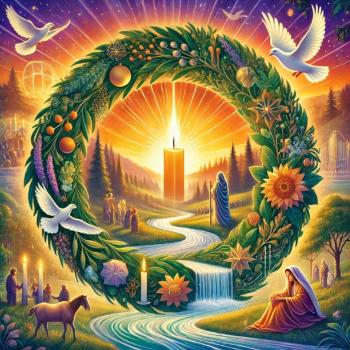An Upside Down Gospel– Fourth Sunday of Advent – December 22,2024
The Adventurous Lectionary
Micah 5:2-5a, Psalm 80:1-7, Hebrews 10:5-10, Luke 1:39-55
On the Horizon of Christmas
Babies turn the world upside down. And, the coming of Jesus turns the world upside down, uplifting the poor and downgrading the wealthy.
Yes, Christmas is on the horizon, only three days away, and today’s scriptures may be lost amid the merriment as well as the Christmas pageants. Despite our concerns about the rise of hate and normalization of incivility in the coming presidential administration, there is a glimmer of hope on the horizon. We experience hope that injustice will give way to justice, and leaders will learn the way of peace. That even presidents and congressional leaders will have a “come to Jesus” moment and change their ways, or lacking that, that our nation will come to its senses, get its priorities right, and care for the vulnerable and oppressed more than the price of milk or lower taxes.
We may hope for the healing of the soul of the nation and a commitment to healing the earth. The Coming One, Mary’s child, may not resolve all our problems, but God’s coming is an image of hope that may empower us to action. Hope encourages agency, not passivity. It opens the future, not determined, but influenced by what we do today.
This Sunday also places Mary at center stage. She is not only a pregnant young woman, carrying the Savior in her womb. She is also God’s messenger of the new age, the age of justice in which our social and economic values are turned upside down. Her words were radical in her time and remain so in our own time.
Small Acts Make a Difference
Micah speaks of a coming ruler who will restore peace to the world. Emerging from unlikely Bethlehem, this leader will walk in the ways of peace and bring true security to the people of Israel and the world. There is a global as well as local feel to this passage. We are people in search of peace, there is anxiety and tentativeness as we look at our own nation’s politics and the global scene. There is growing divisiveness and the rise of white Christian nationalism. The future of our nation is in doubt, the soul of America is listing. Yet, small acts done with love can change the world.
Can the prophetic dream calm our spirits and mobilize us to move from fearful reaction to hopeful action in facing the moral and political dilemmas of our time? We have been dominated by fear – at the macro and micro – whether we worry about the eclipse of white privilege or the fate of democracy. It is clear, however, that more guns can’t save us, deporting immigrants can’t save us, white privilege can’t save us, and partisanship can’t save us. Nor can hopelessness about the future or passivity before demagoguery safe us. Only hearts and hands open to God and our brothers and sisters can bring healing to us and our world.
Light for Our Darkness
In a time of darkness, the people of Israel – and ourselves – cry out for divine light. They have experienced divine absence and now plead for divine presence. In similar fashion, God appears to have left our churches, eclipsed by a false patriotism and the identification of the politics of conspiracy, whiteness, domination, retribution and prevarication with God’s way. The ever-present God has been obscured by our fears of congregational survival. Injustice and infidelity have led to a famine of hearing God’s word.
In Micah’s case, the prayers of Israel have been futile, returning to them void. In a similar fashion, on the verge of the winter solstice, the ancients feared that the darkness would swallow the light, and the world would be plunged into eternal darkness. How they rejoiced as the days grew longer! While the Psalmist’s community might not have anticipated Jesus the Christ, they are yearning for God’s presence in a life-transforming way. They need light to cast out their fear and let God guide their way.
Over twenty-five hundred years later, the hope of Christmas is for light that heals and illumines. We have been in chaos and uncertainty, plagued by small-minded leaders, racist policies, incivility, and divisiveness too long. Fear has ruled us and we are in need of light to find our way. Our fears regarding accelerating climate change, government misconduct, and rising racism are justified, but they must not deaden our spirits or tempt us to become perpetrators of hatred and violence ourselves. We must not lose hope or the future will be lost. Let the light of your countenance shine upon us, God, so that we might find peace and hope in the future.
The Letter of Hebrews proclaims Christ’s all-sufficient sacrifice as the pivotal moment in humankind’s spiritual pilgrimage. The coming of Christ changes everything for humankind. Though the Letter of Hebrews says nothing about Jesus’ birth or the metaphysics of incarnation, it proclaims that we need God’s presence in our midst. Human efforts, even the Jewish sacrificial system, cannot bring salvation. Instead, God’s grace embodied in a human being brings healing to us. We are saved by grace, not human achievements, including religious achievements. This passage can be cited as an early form of substitutionary atonement, the belief that God sends Jesus to die for our sins and that salvation comes through the cross above all else. This does not, however, necessitate the belief that the cross was foreordained or that God required Jesus’ death to save us from our sin. A foreordained cross robs Jesus of any initiative and agency, he is merely a divinely programmed robot. Christ’s sacrifice must involve his claiming of his destiny and not living out a preprogrammed script. Jesus had other options, as his prayer at Gethsemane indicates. Despite his desire to avoid the cross, Jesus chooses to remain in Jerusalem, confront the powers of evil, suffer on the cross, and transform the world.
God in Our Midst, God in Our Mess
The Christmas incarnation is more than a pretty story; it is God in our midst, traveling our path, and bringing healing that is beyond our reach, left to our own efforts. Sacrifice is essential for God and us to transform the world and ensure the well-being of future generations. The cross does not change God’s relationship with us; it reveals God’s sacrificial love for creation. Only a suffering God can save. Only a God entangled in the messy maelstrom of our lives can liberate us.
Fetal Revelation and Women’s Wisdom
The prenatal encounter of the fetal Jesus and John the Baptist seems anachronous in the light of the other readings. Still, there is an energetic harmony that joins John and Jesus from the very beginning. They were spiritual soul friends, bound by God’s vision, from the very beginning. Both babies are conceived remarkably and unexpectedly and will become world-changers by their message.
Today, we know that fetuses are aware of their environment, and are shaped by the emotional and environmental lives of their parents. Fetuses can “know” each other and are heartened by loving parents and communities. This passage reminds us to love the children in our midst – regardless of ethnicity, religion, nation of origin, or economic-family background.
There is an implicit political vision in this passage: First, the passage affirms the reality of prenatal experience. The lives of fetuses cannot be objectified and even amid difficult maternal decisions fetuses must not be relegated to the status of non-entities. While this may not have policy ramifications, it reminds us that fetal life matters along with the lives of pregnant women. We disregard fetuses and endangered species such as pangolins and right whales, surely loved by God and more complex in experience than fetuses, at our moral peril. Women’s lives matter and also the fetus’ life. The challenge is finding compassionate ways to reduce abortion, and this will take a radical transformation of our economics, public policy, women’s rights, and attitudes toward single parents. The solution is not the abolition of Roe vs. Wade or radical restrictions on abortions – indeed, this may not be desirable and is primarily superficial; the solution is a society in which compassion and care reigns and self-interest is sacrificed for the wellbeing of vulnerable women and children, not just fetuses. Second, the lives of prospective parents must be affirmed to ensure that prenatally fetuses have as positive a beginning as possible. We must have a truly family oriented public policy from maternity leave to child care and nutrition. The quest for justice must attend every season of life from conception to death.
Mary’s Upside Down Gospel
Mary’s Magnificat, described in Luke’s gospel, provides an image of hope for the vulnerable and oppressed. Mary’s hymn speaks of a world turned upside down. God desires a transformed economic and social order. The poor will become affluent and the affluent will lose their fortunes, the powerful will be dethroned and ordinary people will take the reins of power. This is an impossible dream, as the wealthy gain more and more power and largesse while the poor struggle to receive health care even in today’s USA. Yet, it is a dream that tells us that our current situation fails the test of divine affirmation. Homelessness, underemployment, unemployment, and economic instability must provoke an uneasy conscience, especially among the powerful, whose largesse is built upon the poverty of others.
Are we willing to turn our economics upside down for Christ’s sake? Are we willing to announce a Jubilee to reverse the fortunes of the haves and have nots? Will billionaires be willing to divest their abundance so others can experience abundant life? Will we let go of our privilege to lift up others? It seems like an impossible dream, and yet the dream beckons us forward. We are the ones we have been waiting for, as poet June Jordan says.
The days are growing shorter for the ancients and for us. Is there hope of illumination? Can we dream of a new era for humankind? These are the hopes of Advent and Christmas, something is being born that will mobilize our hopes and hands to change the world that God loves. May it be so!
+++
Bruce Epperly is Theologian in Residence at Westmoreland Congregational United Church of Christ in Bethesda, Maryland. He is the author of over 80 books, including six volumes of the Twelve Days of Christmas series, “Homegrown Mystics,” and “Saving Progressive Christianity to Save the World.”












